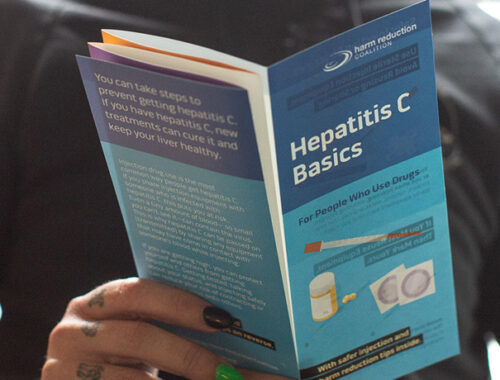About Hepatitis
“Hepatitis” means inflammation of the liver, a vital organ in your body that cleans your blood, fights infections and plays a key role in nutrition. An inflamed or damaged liver can affect your entire body and put your health at risk.
Hepatitis is often caused by a virus. In the U.S., the most common hepatitis viruses are hepatitis A virus, hepatitis B virus, and hepatitis C virus (HCV). Hep A and B are preventable with vaccines. There is no vaccine for hepatitis C, but there are strategies you can use to reduce your risk of HCV infection.
Hepatitis A
Hepatitis A is a very contagious liver infection caused by the hepatitis A virus. You might experience a mild to moderate illness lasting a 2-3 weeks or a severe illness lasting several months. Usually, the body clears hepatitis A virus from your body.
Most often, people get hepatitis A when they come into contact with fecal matter from someone with hepatitis A. This often occurs when eating in a restaurant in which a worker with hepatitis A fails to wash their hands. Infection also happens during activities like anal or butt play and rimming, or by touching an infected person’s butt during sex and then not washing your hands before eating or drinking.
Hepatitis A virus can also be transmitted in water or by eating shellfish or fish from contaminated water sources. You can also contract hepatitis A orally by sharing eating utensils, sharing a joint, or by kissing an infected person.
Not everyone has symptoms but if symptoms develop, they usually appear 2 to 6 weeks after infection. People with hepatitis A might get mild flu-like symptoms, nausea and vomiting, abdominal pain, joint and muscle pain and jaundice (yellowing of the skin, eyes or urine).
The infection usually clears the body within a month or two. Rarely, people can be sick for several months.
A blood test is used to diagnose hepatitis A. Once you have had hepatitis A, you’ll have antibodies in your blood and will probably become immune to it. That means once you’ve had it, you probably won’t get it again.
Hepatitis A can be treated within two weeks of getting it, but most people don’t find out they have hepatitis A until it’s too late for treatment. Then, all you can do is get plenty of rest and drink lots of fluids. In some severe cases, people with hepatitis A need to be hospitalized for supportive care or may suffer acute liver failure.
Yes! You can get vaccinated for hepatitis A. The vaccination requires two doses six months apart. There is also a hepatitis A and B combined vaccination that’s available, which requires three doses. The second dose is given one month after the first; the third, 4-6 months after the initial dose.
To prevent hepatitis A transmission, wash your hands after using the bathroom and before and after sex (especially if you touch your partner’s butt), and use dams for rimming.
If you have HIV and get hepatitis A, you’ll have to stop your HIV medications and possibly drugs you might be taking to treat an opportunistic infection. Many antiretroviral medications are processed by the liver and can’t be tolerated during an acute hepatitis infection (which affects the liver). So it’s recommended that you get immunized for hepatitis A if you have HIV.
Hepatitis B
Hepatitis B is a liver infection caused by the hepatitis B virus. The virus causes liver inflammation and can lead to liver disease.
You can get hepatitis B if the blood, semen, saliva or other body fluid from a person with hepatitis B enters your body. That means you can get hepatitis B from an infected person during condomless oral or anal sex, or by using an infected person’s toothbrush, razor or injection equipment.
People who have hepatitis B infection may experience mild to moderate flu-like symptoms, nausea and vomiting, abdominal pain, joint and muscle pain and jaundice (yellowing of the skin, eyes or urine). Symptoms may take between 1 and 6 months to appear. Some people do not get any symptoms.
Most adults will recover completely from hepatitis B without treatment. But some people may develop a chronic hepatitis B infection, which lasts for more than 6 months. People who develop a chronic hepatitis B infection are at risk of developing cirrhosis and liver cancer.
Yes! A blood test is used to diagnose hepatitis B. If you get hepatitis B, your body will produce antibodies to fight the infection. If you’ve had it before, you will still have the antibodies, so you will probably be immune to the infection.
For people who don’t naturally recover from hepatitis B on their own, a doctor can monitor the infection with blood tests called liver function tests.
Most people clear the infection from their body on their own. People who do develop chronic hepatitis B should speak to their regular doctor about treatment options. People with liver damage may need to be treated while people without liver damage may not need treatment.
The treatment options won’t cure hepatitis B, but they can decrease the severity of the infection and prevent liver damage. Sometimes, people are prescribed antiviral medications, such as Truvada and others, which can be used to treat hepatitis B.
Yes. Hepatitis B can be prevented with a vaccination that’s delivered in a series of three doses. The second dose is delivered one to two months after the first, and the third dose is delivered two to five months after the second. There’s also a combination hepatitis A and B vaccination.
- Use condoms and water-based lube during sex. Don’t forget to change between partners.
- Use gloves and lube during fisting. Make sure you change gloves between partners.
- Don’t share sex toys. Or, put condoms on insertive toys and change them between partners.
- Wash your hands and your toys after sex and between partners.
- Don’t share injection equipment such as needles, syringes, swabs, spoons, filters, water and tourniquets. Use new equipment, and wash your hands before and after injecting. Be sure to dispose of equipment properly.
- Don’t share toothbrushes, razors, nail clippers, or nail scissors.
- Make sure body artists use sterile equipment for tattoos, piercings and other body art.
- Wear disposable gloves if you give someone first aid or are cleaning up blood or other body fluids.
People living with HIV who become infected with hepatitis B might have to temporarily stop taking their antiretroviral HIV medications and medications they may take for opportunistic infections. This is because many HIV medications are processed by the liver and can’t be tolerated during acute hepatitis B illness.
People living with HIV who get hepatitis B may experience a more rapid progression of their HIV illness, although studies have not established this entirely.
Hepatitis C
Hepatitis C is a blood-borne virus, and unlike hepatitis A and hepatitis B, most people who become infected with hepatitis C will develop a long-term chronic infection. Hepatitis C infection is especially common among people who inject drugs.
Because of the effects of HCV on our communities and on people living with HIV, we offer a Hepatitis C Wellness Program, and we’ve dedicated special resources to HCV.
Read more about Hepatitis CRelated Resources

In SF, game-changing programs aim to cure all of hepatitis C
New programs in San Francisco are addressing the “silent epidemic” that affects more than 12,000 community members. HCV cure is possible, but many people don’t know it’s an option.

How an overdose prevention site will reduce public injecting
Overdose prevention sites reduce public injecting and prevent discarded syringes, save cities money, and improve the health of people who inject.

Ending hepatitis C means including people who inject drugs
Innovative HCV cure initiatives in San Francisco prioritize high-needs people who may still be actively injecting drugs.

We say “needle exchange,” but open access—not one-for-one exchange—is best for health
Syringe access programs combat the spread of infectious diseases among people who use injection drugs, improve participant health, and increase linkage to social services including drug treatment.

Men on PrEP & HIV-positive men are getting hepatitis C during sex—here’s why
The hepatitis C virus can live in rectal fluid and semen, which is why it can be transmitted during sex.

You can get it from sex, and 10 other things to know about hep C
Did you know that there are about 35 million people in the US with hepatitis C—and about...





